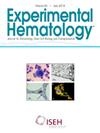FOXP1 contributes to murine hematopoietic stem cell functionality
IF 2.1
4区 医学
Q2 HEMATOLOGY
引用次数: 0
Abstract
Transcription factor forkhead box P1 (FOXP1) is a key regulator of immune cell functions. We have shown that FOXP1 contributes to the expansion of human hematopoietic stem/progenitor cell (HSPC) and acute myeloid leukemia cells. Here, we investigated the role of FOXP1 in early adult mouse hematopoiesis in vivo. We showed that loss of hematopoietic-specific FOXP1 expression leads to attrition of the hematopoietic stem cell (HSC) and multipotent progenitor (MPP)-1 compartment in parallel with enhancement of myeloid-biased MPP3 in adult bone marrow and fetal liver. Transplantation experiments confirmed that FOXP1-deficient bone marrow had an intrinsic reduced HSC compartment. FOXP1-deficient MPP compartments also showed enhanced proliferation with G0 phase reduction. Transcriptome analyses revealed that FOXP1-deficient HSC exhibited reduced stemness and enhanced expression of cell proliferation pathways. Thus, our current results revealed that FOXP1 plays a critical role in early murine hematopoiesis by maintaining HSCs, limiting the expansion of all MPP compartments, and restricting early myeloid commitment in vivo.
FOXP1有助于小鼠造血干细胞的功能。
转录因子叉头盒P1 (FOXP1)是免疫细胞功能的关键调控因子。我们已经证明FOXP1有助于人类造血干细胞/祖细胞(HSPC)和急性髓性白血病细胞的扩增。在这里,我们研究了FOXP1在早期成年小鼠体内造血中的作用。我们发现造血特异性FOXP1表达的缺失导致HSC和多能祖细胞(MPP)-1室的磨损,同时在成人骨髓和胎儿肝脏中骨髓偏向性MPP3的增强。移植实验证实foxp1缺失的骨髓具有内在的HSC室减少。foxp1缺失的MPP细胞也表现出G0期减少的增殖增强。转录组分析显示,foxp1缺失的HSC表现出干细胞性降低和细胞增殖途径的表达增强。因此,我们目前的研究结果揭示了FOXP1在早期小鼠造血中的重要贡献,通过维持HSC,限制所有MPP区室的扩张和体内早期髓质承诺的限制。
本文章由计算机程序翻译,如有差异,请以英文原文为准。
求助全文
约1分钟内获得全文
求助全文
来源期刊

Experimental hematology
医学-血液学
CiteScore
5.30
自引率
0.00%
发文量
84
审稿时长
58 days
期刊介绍:
Experimental Hematology publishes new findings, methodologies, reviews and perspectives in all areas of hematology and immune cell formation on a monthly basis that may include Special Issues on particular topics of current interest. The overall goal is to report new insights into how normal blood cells are produced, how their production is normally regulated, mechanisms that contribute to hematological diseases and new approaches to their treatment. Specific topics may include relevant developmental and aging processes, stem cell biology, analyses of intrinsic and extrinsic regulatory mechanisms, in vitro behavior of primary cells, clonal tracking, molecular and omics analyses, metabolism, epigenetics, bioengineering approaches, studies in model organisms, novel clinical observations, transplantation biology and new therapeutic avenues.
 求助内容:
求助内容: 应助结果提醒方式:
应助结果提醒方式:


